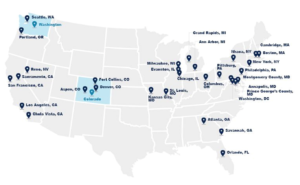
President Biden announced Friday the first-of-its-kind Buildings Performance Standards Coalition during remarks at the U.S. Conference of Mayors winter meeting. The announcement highlights the importance of enacting policy to support emission reductions in all buildings—both new and existing. The Coalition includes 33 state and local governments with a goal of advancing legislation or regulation in each locale by Earth Day 2024. Jurisdictions included in the partnership encompass 20% of the U.S. building footprint and 22% of its total population.
“NBI lauds the White House announcement of this new initiative on Building Performance Standards,” said CEO Ralph DiNola. “Now is the time to put the $1.8 billion investment from the Bipartisan Infrastructure Law to work. NBI and others in our industry are prepared to support jurisdictions pursuing BPS policies, an essential component in the climate fight.”
Two states, Colorado and Washington, have signed onto the initiative, as well some of the largest U.S. cities of New York, Los Angeles, Chicago, Washington DC, Philadelphia, Atlanta, Boston, and San Francisco. A total investment of $1.8 billion from the Bipartisan Infrastructure Law will be made available to state and local governments through the Department of Energy to expand building retrofits and policy implementation throughout the nation.
BPS can help to accelerate existing building upgrades
“Although programs to encourage energy efficiency improvements in existing buildings have operated for decades, even the best programs result in upgrades of only 1–2% of eligible buildings each year,” said NBI Codes Director Kim Cheslak. “Building Performance Standards can help to vastly improve these numbers.” BPS can add a level of stringency to the process of building retrofits, requiring greater changes while also allowing more adaptability by focusing on achievable, long-term targets. The bigger picture thinking on the long-term impact within BPS also helps to discourage investments in processes or technology that could also be harmful to the environment.
Most existing buildings will still be operating in 2050 and beyond, far past most jurisdictional climate goals. BPS can help to incorporate existing buildings into a city or state’s climate action plan, signaling the importance of cutting their carbon footprint to fight the climate crisis.
As highlighted in the most recent IPCC report, climate change is rapid and continually intensifying, meaning that ambitious actions and policy must be put into place in order to combat negative environmental impacts. Most existing buildings will still be operating in 2050 and beyond, far past most jurisdictional climate goals. BPS can help to incorporate existing buildings into a city or state’s climate action plan, signaling the importance of cutting their carbon footprint to fight the climate crisis.
Supporting through tools and technical assistance
NBI has previously worked with various jurisdictions involved in the Coalition including Los Angeles, New York, Portland, Denver, Austin, Boston, Atlanta, and Washington DC to help set appropriate targets aligning with climate goals, emissions reductions, and achieving long term compliance. In these relationships, we have provided technical support by using benchmarking data to set unique targets for each jurisdiction.
Setting appropriate targets for each city and state creates important synergy by aligning with the pace of each region’s individual climate goal timelines. NBI uses benchmarking data and various target projections to understand potential policy impacts such as total reductions in GHG emissions and the number of buildings that fall under the criteria to be retrofitted during each BPS cycle. The data helps cities and states better understand the potential affects of the policies as well plan ahead to provide resources that can lead to improved compliance. These projections inform stakeholders and policymakers on which buildings would fall out of compliance in each cycle, allowing them time to estimate potentially needed incentives and tools that can ease the retrofit process.
Providing equitable solutions
While early adoptions of BPS tend to place sole focus on reduction of energy and emissions, more recent implementation is eliciting more holistic solutions related to health and safety of local communities. A focus on cleaner energy in buildings (i.e. electrification and elimination of gas combustion) can lead to better air quality for building occupants and the surrounding areas.

A focus on energy efficiency and electrification retrofits across the building sector will also allow for job creation in addition to lower energy bills for consumers. Member cities of the Coalition are already partnering with building trades and unions to train a local workforce that will be called on for the soon-to-be growing number of retrofit projects. In addition, these will likely be higher-wage jobs for local communities. On average, efficiency workers earn 28% above the national median wage.
A Coalition that will lead to great progress
At the end of the day, implementing BPS across the country will help immensely to decarbonize the building sector. The results will be especially impactful in more urban, densely packed areas where taller and larger building are more prevalent. Due to the larger building stock, these cities typically have a greater share of greenhouse gas emissions.
“Energy used in the operation of existing buildings represents nearly 30% of greenhouse gas (GHG) emissions in the U.S. and can represent close to 75% of emissions in densely populated cities” said NBI Director of Policy Jim Edelson. “Building Performance Standards offer local and state policy makers a proven tool to lower energy bills, create high-paying jobs and reduce indoor air pollution while dramatically reducing carbon footprints.” We look forward to seeing jurisdictions across the nation take advantage of the technical and financial support made available through this initiative. For more information on BPS and NBI’s work on the topic, visit our Building Performance Standards webpage.
Photo: Kansas City, Mo.
by Sarah Chaney, Marketing and Communications Manager
Bio
Did you enjoy this content? Consider supporting NBI’s work with a donation today.
